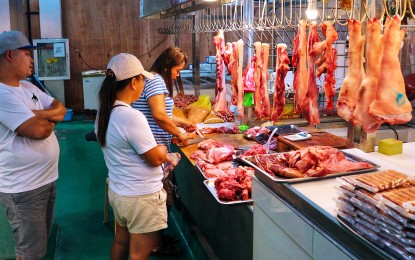
MEAT SUPPLY. Various pork cuts are sold at stable prices at the Agdao Public Market in Davao City on March 19, 2024. The Department of Agriculture on Wednesday (July 17, 2024) said the country has imported 647 million kilos of meat in the first six months of the year due to the effects of African swine fever, avian flu and the El Niño phenomenon on local meat production. (PNA photo by Robinson Niñal Jr.)
MANILA – The Department of Agriculture (DA) on Wednesday reported that the country has imported more than 600 million kilograms of meat in the first half of the year due to the effects of African swine fever (ASF), avian flu, and the El Niño phenomenon.
“The grand total is 647 million kilograms, ang pinakamalaki ay sa (the largest is in) pork at 317 million kg, chicken 222 million (kg),” DA Assistant Secretary Arnel De Mesa said in an interview.
The total is higher than the 590.766 million kilograms of meat imported from January to June last year.
De Mesa said this was due to the limited supply of local pork due to the ASF, and the low production in the poultry sector caused by the El Niño and avian influenza.
For ASF, the DA earlier reported the approval of the Food and Drug Administration (FDA) on the government use of ASF vaccines from Vietnam.
However, a six-month controlled vaccination will have to be undertaken first before it can be used commercially.
Meat Importers and Traders Association (MITA) president emeritus Jesus Cham also attributed the importation hike to the decreased local output alongside higher production cost.
“This suggests that the high price of local pork and poultry continue to make imported meat competitive and attractive,” he said in a separate Viber message.
Earlier, the Bureau of Animal Industry (BAI) reported the total meat import at more than 524.675 million kilograms for the first five months of the year.
This includes 253.55 million kg import volume of pork, 181.23 million kg. of chicken, 68.53 million kg of beef, and 20.44 million kg of buffalo, with the lowest import volume recorded for duck, lamb, and turkey.
Cham, meanwhile, said Executive Order (EO) No. 62 approved by President Ferdinand R. Marcos Jr. would “lend stability and predictably” for meat importers until 2028.
Under EO 62, the lower tariffs for pork, fresh, chilled, or frozen meat will remain at 15 percent for in-quota and 25 percent for out-quota. (PNA)
